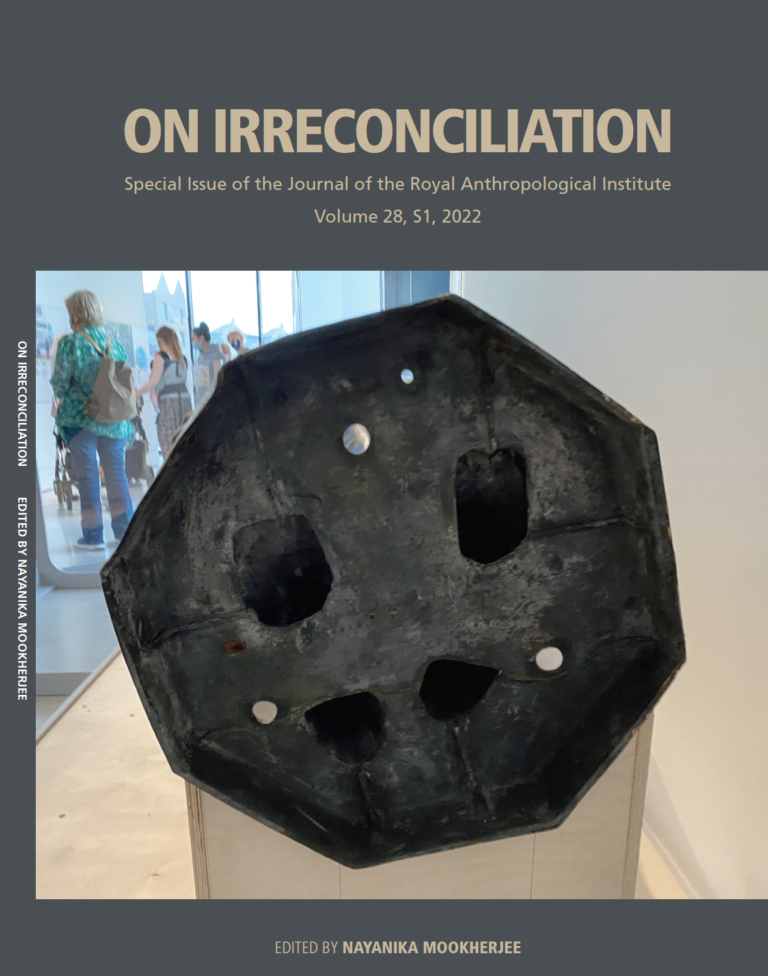JRAI Special Issue 2022 Online Launch
Friday 30 September 2022, 2.00- 4.00pm (BST)
Register for the Zoom event here: https://us02web.zoom.us/webinar/register/WN_yn5KrUVbT1eUtAaS9EX3KA
On Irreconciliation

with special issue guest editor
Nayanika Mookherjee (Prof of Anthroppology and Co-Director of the Institute of Advanced Study at Durham University)
and speakers
Bjørn Enge Bertelsen (Prof of Social Anthropology at University of Bergen)
Vindhya Buthpitiya (Lecturer in Social Anthropology at the University of St Andrews)
Lisette Josephides (Emeritus Professor at Queen's University)
Ronald Niezen (James McGill Professor of Anthropology and Associate Member of the Faculty of Law at McGill University)
Noa Vaisman (Associate Professor in the Anthropology Department at Aarhus University)
Jacco Visser (Research assistant at the School of Communication and Culture at Aarhus University)
Richard Ashby Wilson (Associate Dean for Research and Professor of Anthropology and Law at University of Connecticut)
chaired by Adam Reed (Reader in Social Anthropology at the University of St Andrews)
Irreconciliation focuses on the less examined but frequent ethnographic instances when survivors refuse to forgive in response to persistent impunity for past injustices, particularly in the face of the absence-presence of the rule of law and staged processes of justice which serve the powerful. In most instances of post-confl ict transitional justice and ‘positive’ reconciliatory exercises, it is incumbent upon survivors to forgive, reconcile, and seek closure as a demonstration of peacefulness, even in the aftermath of processes that claim to address injustice but are compromised. Various anthropologists have criticized reconciliation and related forms of ‘alternative justice’ extensively but within the framework of maintaining social bonds and the rule of law.
This volume is an ethnographically informed, interdisciplinary theorization which makes irreconciliation visible in the contexts of Papua New Guinea, Mozambique, Bangladesh, Canada, Argentina, Sri Lanka, Colombia, the United States, Northern Ireland, and the wider United Kingdom. Irreconciliation allows an important examination of the rule of law within processes of unresolved genocidal injustices and debates relating to slavery, Black Lives Matter, and institutional responses. It is a vigilance against impunity, against a ‘window-dressed’, symbolic performance of redress. Contributors demonstrate the relationship of irreconciliation with law, aesthetics, temporality, resistance, and identify the limits of the concept. This volume wishes to make a theoretical and ethnographic case for irreconciliation as both a social and a political phenomenon. We propose an understanding of the past based on a positive commitment to ‘irreconciliation’ which might interest anthropologists, historians, philosophers, critical legal and political theorists, and scholars of peace, conflict resolution, and transitional justice
You can find the Special Issue online here https://rai.onlinelibrary.wiley.com/toc/14679655/2022/28/S1
From 23rd September till end of October it will be free access entirely, so that attendants can have a chance to read it before and after the event.
After that, you can purchase a print copy here: https://www.wiley.com/en-gb/On+Irreconciliation-p-9781119933267